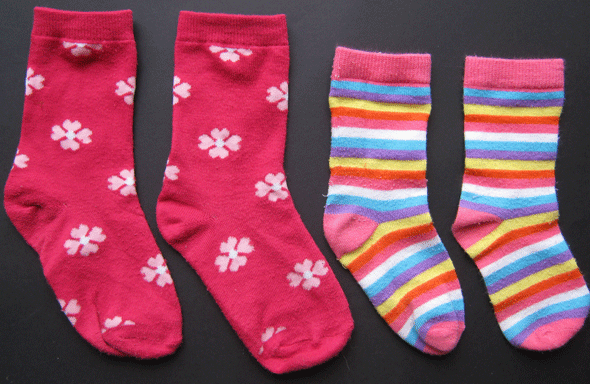Learning Through Playing & Doing: Laundry Mathematics
You know that I am a believer in children learning to help with chores as part of being a member of a family. As well as teaching children life skills, there can be all sorts of other learning that occurs through everyday tasks and chores. Like the early mathematics hiding in a basket of clean laundry 🙂
Here are a few ideas to get you started…
Sorting and Grouping
What is it? The child identifies a common feature to form a group, as separate from another group.
Why is it important? Classification is important to learning to organise knowledge and ideas. Children need to learn to discriminate differences, to reason and analyse, and to select items to form groups.
You might say “Could you make one pile of all the underpants and one pile of the socks?” or “Let’s make one pile of your clothes and one of Daddy’s”
Matching
What is it? The child can identify which items are the same and which are different.
Why is it important? The ability to discriminate difference is important to all sorts of learning and not just mathematical concepts, for example, learning to recognise the difference between similar letters (b and d) is important to learning to read and write.
You might say “Can you find the pair of red socks?” or “Can you find two pairs of pink knickers?”
Pairing
What is it? The child arranges items in sets of two, similar in form and/or function, that are dependent upon each other.
Why is it important? Children are learning about one-to-one correspondence which is important to learning to count.
You might say “Could you please put each sock in the pile together with its matching partner?”
Comparing
What is it? The child is learning to look more specifically at colour, size, shapes, patterns and number of items in order to compare items or groups of items.
Why is it important? Children learn to look closely at similarities and differences to compare two different items or groups of items.
You might say “Do we have more black socks or more white socks?” or “Which member of our family has the biggest socks?” or “Who do you think has the most underpants in the pile – you or Daddy? Let’s check and see.”
Counting
What is it? Learning to count aloud in sequence.
Why is it important? Having regular, fun opportunities to practice counting out loud is fabulous for reinforcing the correct number sequence.
You might say “How many pairs of socks have we folded? Let’s count them together.”
Do your children help you sort and fold the laundry?
Related Posts
- Learning That Happens Everyday
- Everyday Learning At Home
- Learning Letters Playfully
- The Preschool Balancing Act


I love these ideas. I started with both of my boys when they were about 1 1/2. I would ask them to find the socks in the bin. I would “Hide” socks right on top or in easy to see places in the bin as I folded. It works so great to keep them occupied and out of my folded pile. These ideas will definitely help expand our learning for my 3 year old. Thanks!
I started early with Immy too, Jackie 🙂
I do this with my class. First we read the book, Mrs. Wishy Washy and afterward we talk about how she likes everything to be clean and tidy. Then I throw socks all over the classroom and let the children run around trying to find a matching pair of socks. They must find the mate before they can put the socks back into my mini laundry basket! They LOVE this game.